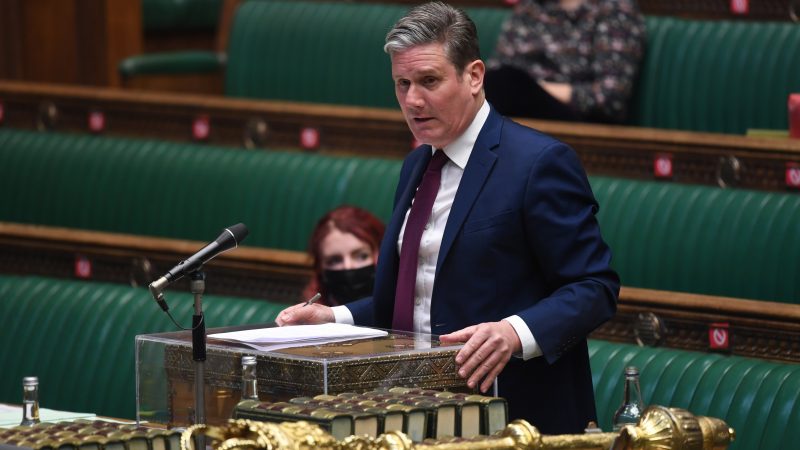
Keir Starmer has welcomed the announcement of a new military partnership between the US, Australia and the UK, seen as an effort to counter China, but asked how it would affect relations with the country.
Boris Johnson said today that the trilateral partnership, the ‘Aukus pact’, would “preserve security and stability around the world”. China has condemned the agreement as “extremely irresponsible”.
Addressing the House of Commons this morning following the Prime Minister’s statement, Starmer warned the government against redirecting resources away from existing international security arrangements.
“Recent events in Afghanistan show us how precarious international stability can be. New challenges can emerge and issues in far-away corners of the globe can quickly turn into threats at home. So Labour welcomes increased cooperation with our allies,” the Labour leader said.
“The lesson of the past few weeks is that Britain must look after our most important relationships or our influence and security quickly declines. So, Labour welcomes this announcement.”
Starmer asked Johnson to set out the what the agreement “means in practice”. He pointed out that the strategic review identified China as a “systemic competitor” but also said the UK needs to maintain a commercial relationship with the country.
“China’s assertiveness does pose risks to UK interests in a secure pacific region, in a stable trading environment, and in democracy and human rights. We need to deal with those risks. Defend our values and defend our interests,” he said.
“But the same review also rightly stated that the UK must maintain a commercial relationship with China. And we must work with them on the defining global issues of the day like climate change and pandemic preparedness.”
The Prime Minister told MPs this morning that the new agreement is “not intended to be adversarial towards any other power” but instead “reflects the close relationship that we have with the United States and with Australia”.
The Labour leader also told Johnson that NATO is “our most important strategic alliance” and “the most successful”, and asked the Prime Minister to guarantee that the new partnership would not mean resources redirected from NATO.
He added: “We are also in the ‘five-eyes’ intelligence sharing arrangement with Canada, New Zealand, Australia and the US. It is vital to our security. Can the Prime Minister assure the House that this new trilateral arrangement will not weaken our intelligence capabilities by producing a two-tier five eyes?”
Below is the full text of the statement made by Keir Starmer this morning.
I would like to thank the Prime Minister for advance copy of his statement. The recent events in Afghanistan shows us how precarious international stability can be. New challenges can emerge and issues in faraway corners of the globe can quickly turn into threats at home. So Labour welcomes increased cooperation with our allies.
Australia and America are two of our closest security partners. Sharing resources and intelligence with them makes them safer, makes Britain safer, and makes the world safer. The lesson of the past few weeks is that Britain must look after our most important relationships or our influence and security quickly decline. So, Labour welcomes this announcement but I do hope the Prime Minister can now outline in more detail what the agreement means in practice.
The strategic review identified China as a “systemic competitor” and China’s assertiveness does pose risks to UK interests in a secure pacific region, in a stable trading environment, and in democracy and human rights. We need to deal with those risks. Defend our values and defend our interests.
But the same review also rightly stated that the UK must maintain a commercial relationship with China. And we must work with them on the defining global issues of the day like climate change and pandemic preparedness. Without diplomatic strategy and skill, those goals will come into conflict.
So what plan does the Prime Minister have to ensure that this new arrangement increases rather than decreases our ability to influence China? With COP26 around the corner, the UK’s approach to China matters. But for years Conservative governments pursued a naïve “Golden Era” policy which turned a blind eye to security and human rights concerns. That policy unraveled and we are still managing the consequences.
In order to protect our security and interests, we also need to look after our broader alliances. NATO remains our most important strategic alliance. It is also the most successful. It has delivered security and peace in Europe for three quarters of a century. And whatever the merits of a Indo-pacific tilt, maintaining security in Europe must remain our primary objective.
So can the Prime Minister guarantee that this arrangement will not see resources redirected from Europe and the High North to the pacific? And can he guarantee that this arrangement will strengthen rather than weaken the NATO alliance including our indispensable bilateral relationship with France?
We are also in the ‘five-eyes’ intelligence sharing arrangement with Canada, New Zealand, Australia and the US. It is vital to our security. Can the Prime Minister assure the House that this new trilateral arrangement will not weaken our intelligence capabilities by producing a two-tier five eyes?
Finally, Mr Speaker, this arrangement clearly brings potential economic opportunities for Britain. We need the well-paid, high-skilled jobs that the defense industry provides in every corner of Britain. So what has the Prime Minister done to ensure that Britain gets its fair share of any contracts that come out of these arrangements? And what will he do to ensure that no region or nation in Britain misses out on any job opportunities that this arrangement may bring? Thank you, Mr Speaker.




More from LabourList
‘Factionalism at the top is weakening Labour – and handing a gift to Reform’
‘Europe must stand strong on its own as US security guarantees grow conditional’
‘Tackling poverty should be the legacy of Keir Starmer’s government’